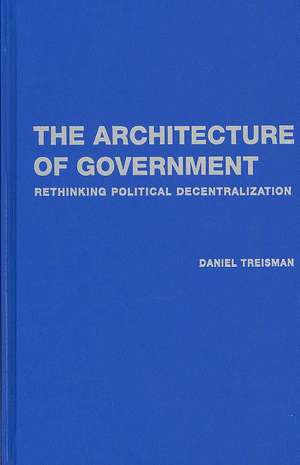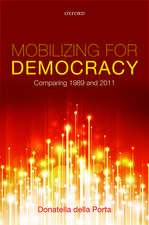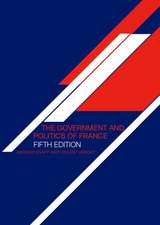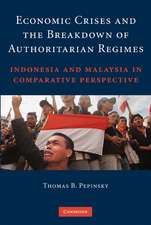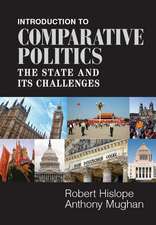The Architecture of Government: Rethinking Political Decentralization: Cambridge Studies in Comparative Politics
Autor Daniel Treismanen Limba Engleză Hardback – iul 2007
| Toate formatele și edițiile | Preț | Express |
|---|---|---|
| Paperback (1) | 264.56 lei 6-8 săpt. | |
| Cambridge University Press – iul 2007 | 264.56 lei 6-8 săpt. | |
| Hardback (1) | 358.00 lei 6-8 săpt. | |
| Cambridge University Press – iul 2007 | 358.00 lei 6-8 săpt. |
Din seria Cambridge Studies in Comparative Politics
-
 Preț: 179.15 lei
Preț: 179.15 lei -
 Preț: 267.61 lei
Preț: 267.61 lei -
 Preț: 239.36 lei
Preț: 239.36 lei - 9%
 Preț: 594.68 lei
Preț: 594.68 lei -
 Preț: 160.82 lei
Preț: 160.82 lei -
 Preț: 269.58 lei
Preț: 269.58 lei -
 Preț: 264.74 lei
Preț: 264.74 lei -
 Preț: 177.28 lei
Preț: 177.28 lei -
 Preț: 225.70 lei
Preț: 225.70 lei -
 Preț: 164.94 lei
Preț: 164.94 lei -
 Preț: 236.42 lei
Preț: 236.42 lei -
 Preț: 185.64 lei
Preț: 185.64 lei -
 Preț: 233.13 lei
Preț: 233.13 lei -
 Preț: 206.71 lei
Preț: 206.71 lei -
 Preț: 231.82 lei
Preț: 231.82 lei -
 Preț: 206.52 lei
Preț: 206.52 lei -
 Preț: 201.24 lei
Preț: 201.24 lei -
 Preț: 358.38 lei
Preț: 358.38 lei -
 Preț: 203.42 lei
Preț: 203.42 lei -
 Preț: 232.45 lei
Preț: 232.45 lei -
 Preț: 257.82 lei
Preț: 257.82 lei -
 Preț: 191.12 lei
Preț: 191.12 lei -
 Preț: 158.77 lei
Preț: 158.77 lei -
 Preț: 199.05 lei
Preț: 199.05 lei - 11%
 Preț: 553.80 lei
Preț: 553.80 lei - 11%
 Preț: 695.06 lei
Preț: 695.06 lei -
 Preț: 288.80 lei
Preț: 288.80 lei -
 Preț: 262.06 lei
Preț: 262.06 lei - 11%
 Preț: 691.66 lei
Preț: 691.66 lei -
 Preț: 388.29 lei
Preț: 388.29 lei -
 Preț: 288.04 lei
Preț: 288.04 lei -
 Preț: 228.00 lei
Preț: 228.00 lei -
 Preț: 385.28 lei
Preț: 385.28 lei -
 Preț: 312.89 lei
Preț: 312.89 lei -
 Preț: 224.44 lei
Preț: 224.44 lei -
 Preț: 287.07 lei
Preț: 287.07 lei -
 Preț: 251.27 lei
Preț: 251.27 lei -
 Preț: 313.70 lei
Preț: 313.70 lei -
 Preț: 277.38 lei
Preț: 277.38 lei -
 Preț: 423.79 lei
Preț: 423.79 lei - 11%
 Preț: 552.94 lei
Preț: 552.94 lei - 11%
 Preț: 554.43 lei
Preț: 554.43 lei - 14%
 Preț: 783.26 lei
Preț: 783.26 lei
Preț: 358.00 lei
Nou
Puncte Express: 537
Preț estimativ în valută:
68.50€ • 71.78$ • 56.63£
68.50€ • 71.78$ • 56.63£
Carte tipărită la comandă
Livrare economică 11-25 aprilie
Preluare comenzi: 021 569.72.76
Specificații
ISBN-13: 9780521872294
ISBN-10: 0521872294
Pagini: 348
Ilustrații: 4 tables
Dimensiuni: 157 x 235 x 21 mm
Greutate: 0.58 kg
Ediția:New.
Editura: Cambridge University Press
Colecția Cambridge University Press
Seria Cambridge Studies in Comparative Politics
Locul publicării:New York, United States
ISBN-10: 0521872294
Pagini: 348
Ilustrații: 4 tables
Dimensiuni: 157 x 235 x 21 mm
Greutate: 0.58 kg
Ediția:New.
Editura: Cambridge University Press
Colecția Cambridge University Press
Seria Cambridge Studies in Comparative Politics
Locul publicării:New York, United States
Cuprins
1. Introduction; 2. The political process; 3. Administrative efficiency; 4. Competition among governments; 5. Fiscal policy and redistribution; 6. Fiscal coordination and incentives; 7. Citizens and government; 8. Checks, balances, and freedom; 9. Acquiring and using knowledge; 10. Ethnic conflict and secession; 11. Data to the rescue?; 12. Conclusion: rethinking decentralization.
Recenzii
"This superb book deconstructs political decentralization. Shifting power from central to local governments is widely touted as the key instrument for the creation of effective, responsive government. The evidence does not support these claims, argues Treisman. Using game theory to probe the logic of arguments, and empirical research to test them, Treisman challenges the assumptions that underlie much of the common wisdom being disseminated to guide the design of public institutions. This book needs to be read by policy makers and researchers, from the World Bank to constitution writers and politically engaged citizens the world around."
Peter Gourevitch, University of California, San Diego
Peter Gourevitch, University of California, San Diego
Notă biografică
Descriere
Examines the most influential arguments about the consequences of political decentralization.
